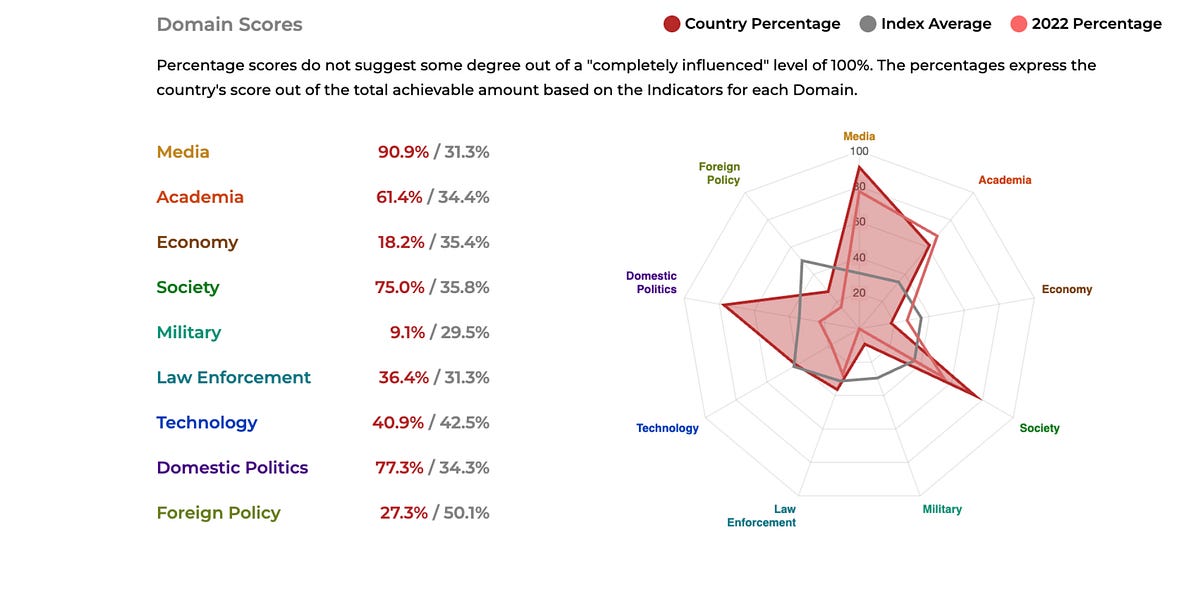A measure of Beijing’s political influence surged more than 50 percent in Canada over the past two years, an international study finds, after media reports of China’s clandestine election interference were confirmed in public reviews. The China Index 2024, produced by Taiwan’s Doublethink Lab and its global research partners, shows that Beijing’s presence in Canadian politics, academia, media, and society is advancing at a faster pace than almost anywhere else in the democratic world.
[…]
The most alarming takeaway is that China’s increasing grip on Canadian institutions is driving dependence — a factor that could pull Canadian decision makers closer into Beijing’s orbit on economic, security, and social policies.
[…]
The results reflect a “triple movement” in Canada’s relationship with Beijing: greater exposure through academic, media, and technology ties; sustained pressure through China’s diplomacy and retaliation; and rising alignment in the two nations’ policy positions.
“Canada experienced rising exposure and alignment with the PRC alongside sustained high levels of coercive pressure,” the report says, “highlighting a complex mix of engagement and influence dynamics.”
[…]
This confirms a longstanding pattern documented by The Bureau: pro-Beijing Chinese-language outlets in Canada continue to echo Beijing’s lines on Taiwan, Hong Kong, and Xinjiang. Diaspora-linked cultural organizations, often connected to PRC diplomats or United Front groups, are also highly active. The Index notes that between 2022 and 2024, diaspora cultural events tied to PRC entities nearly doubled worldwide, rising from 38 percent of countries surveyed to 72 percent. Canada is among the cases where these events are expanding and carry political overtones.
[…]
Beijing’s penetration of Canadian technology sectors, from consumer electronics to PRC-linked equipment in infrastructure, remains high. Globally, PRC-linked technology is now embedded in 78.8 percent of critical infrastructure sectors, up from 65.4 percent in 2022, and Canada is part of that trend.
The Economic domain, by contrast, declined slightly for Canada between 2022 and 2024. This may reflect Ottawa’s incremental steps to tighten foreign investment reviews and limit acquisitions in sensitive sectors. Still, the decline in the economic category did not offset the steep rise in politics and technology, which now dominate Canada’s dependence profile.
[…]



I don’t understand why you care more about the funding of this think tank than about the fact that China is deliberately interfering in Canadian elections. You will agree that the government in Beijing poses a big threat to democracy, right?
I’m sorry but where’s the actual evidence that China is this “threat to democracy”? The articles you posted say that the government says that but the government has yet to supply hard evidence of Chinese interference in elections outside of some bot activity on social media. If troll comments on Facebook comment sections is the bar for “threat to democracy” then the bar is so low it’s practically worthless.
Wow, can you point to one place where I said there’s no foreign interference?
I feel like I’m interacting with someone who read about medical benefits of some health technique from a credible source and now believes every huckstery health influencer trying to sell a product on top of the narrative.
That’s basically what a think tank like this is.
Yes. Credibility matters. New information being introduced by a source that has credibility issues should be seriously questioned.